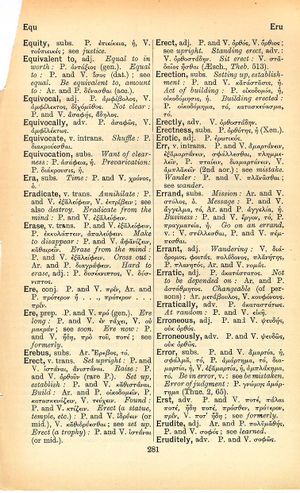errand: Difference between revisions
From LSJ
τὸ κακὸν δοκεῖν ποτ' ἐσθλὸν τῷδ' ἔμμεν' ὅτῳ φρένας θεὸς ἄγει πρὸς ἄταν → evil appears as good to him whose mind the god is leading to destruction (Sophocles, Antigone 622f.)
(Woodhouse 3) |
(CSV4) |
||
| Line 1: | Line 1: | ||
{{ | {{Woodhouse1 | ||
| | |Text=[[File:woodhouse_281.jpg|thumb|link={{filepath:woodhouse_281.jpg}}]]'''subs.''' | ||
<b class="b2">Mission</b>: Ar. and V. [[στόλος]], ὁ. | |||
<b class="b2">Message</b>: P. and V. [[ἄγγελμα]], τό, Ar. and P. [[ἀγγελία]]. ἡ. | |||
<b class="b2">Business</b>: P. and V. [[ἔργον]], τό, P. [[πραγματεία]], ἡ. | |||
<b class="b2">Go on an errand</b>, v.: V. στέλλεσθαι, P. and V. πέμπεσθαι. | |||
}} | }} | ||
Revision as of 09:40, 21 July 2017
English > Greek (Woodhouse)
subs.
Mission: Ar. and V. στόλος, ὁ. Message: P. and V. ἄγγελμα, τό, Ar. and P. ἀγγελία. ἡ. Business: P. and V. ἔργον, τό, P. πραγματεία, ἡ. Go on an errand, v.: V. στέλλεσθαι, P. and V. πέμπεσθαι.

